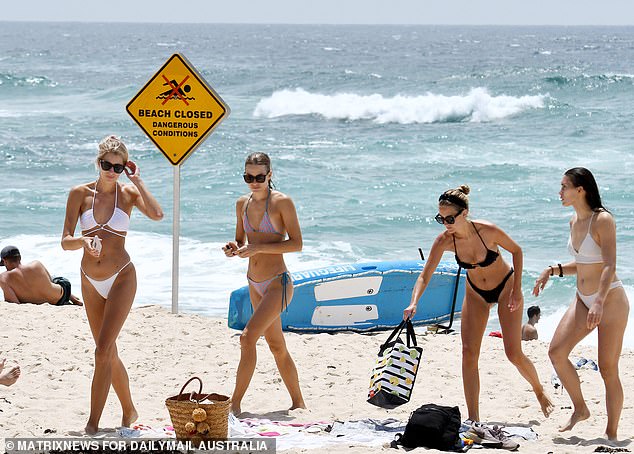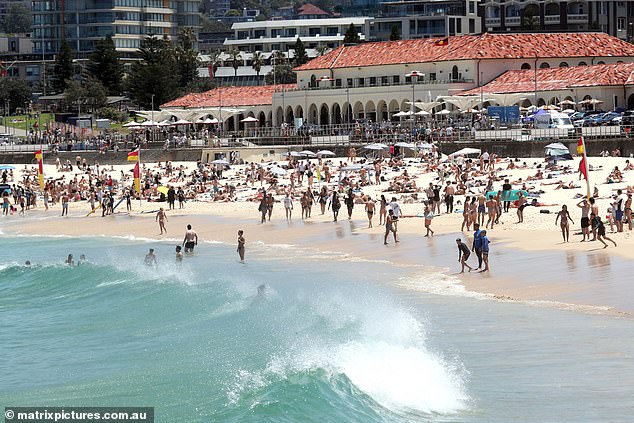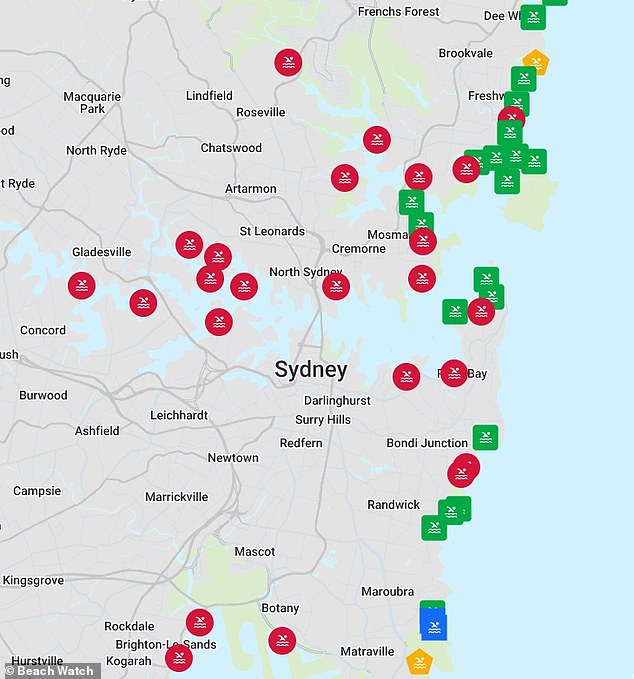Australians have been urged to avoid dozens of beaches over fears the water could be contaminated with harmful bacteria.
And an infection is not the only risk at play in affected waterways, as one academic warns that stormwater pollution after a week of rain could also attract bull sharks.
Warnings have been issued for 56 Sydney beaches that the state government’s water quality monitor, Beachwatch NSW, deemed unsafe for swimming on Friday.
“Some swimming sites in the Sydney region and the Central Coast may continue to be affected by stormwater pollution,” the agency said.
“Before swimming, check for signs of contamination.”
The agency also issued an alert to beachgoers informing them that pollution is likely at popular harbor beaches including Tamarama, Brontë and Queenscliff.
Popular swimming spots in Sydney’s south and northern beaches have also been affected, including Brighton Le Sands Baths, Barrenjoey Beach and Umina Beach.
The alert has also been issued for several tourist hotspots up to the Central Coast, including The Entry Channel and Hordens Beach, near Sutherland, in Sydney’s south.
Popular swimming spots in Sydney’s south and northern beaches have also been affected, including Brighton Le Sands Baths, Barrenjoey Beach and Umina Beach.

Warnings have been issued for 56 Sydney beaches that were deemed unsafe for swimming by the state government’s water quality monitor, Beachwatch NSW, on Friday.
Beachwatch is also known to be testing water samples for dangerous bacteria such as E. coli.
The bacteria can cause diarrhea, vomiting, fever and loss of appetite.
A spokesperson for the NSW Department of Climate Change, Energy, Environment and Water said heavy rainfall is impacting water quality in waterways.
“On beaches, people should avoid swimming during heavy rain and for at least a day afterwards,” the spokesperson said. yahoo.
“In estuaries and inland waterways, avoid swimming for up to three days after heavy rain.”
Daily Mail has contacted the department for further comment.
The warning comes after much of Australia’s east coast was hit by heavy rain and thunderstorms for most of this week.
Heavy rain is expected from Friday to Sunday in Sydney and Canberra, with a high chance of rain expected over the weekend in Brisbane.

Beachwatch is also known to be testing water samples for dangerous bacteria such as E. Coli, which can cause diarrhoea, vomiting, fever and loss of appetite (pictured at Bondi Beach in Sydney).
Melbourne residents will also be affected by wet weather on Sunday, with highs of 28C forecast in the city.
A monsoon weather system will also develop over northern Australia late next week, according to Weatherzone.
The system will increase the risk of heavy rain, thunderstorms and tropical cyclones.
Swimmers have also been urged to watch out for bull sharks, as well as contaminated water in some waterways.
Bond University professor Dr Daryl McPhee said the recent wet weather event has provided the creatures with an ideal environment to search for food and nutrients.
“Areas affected by rain generally see more bull sharks, but there is often a lag between when it rains in a basin and when bull sharks are most common,” Dr McPhee said.
A bull shark was spotted off Bondi on Thursday, while surf lifeguards spotted a great white shark off Crescent Head on the New South Wales mid north coast on Friday afternoon.
Authorities closed the beach and people were evacuated from the area.
However, Dr McPhee said contaminants in the water pose a greater risk to swimmers than sharks.


